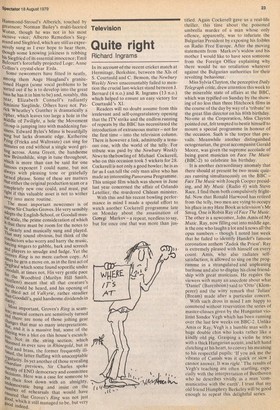Television
Quite right
Richard Ingrams
In its account of the recent cricket match at Hermitage, Berkshire, between the XIs of S. Courtauld and C. Benson, the Newbury Weekly News unaccountably failed to mention the crucial last-wicket stand between J. Bernard (4 n.o.) and R. Ingrams (13 n.o.) which helped to ensure an easy victory for Courtauld 's Xl.
Readers will no doubt assume from this irrelevant and self-congratulatory opening that the ITV strike and the endless running of repeats by the BBC has necessitated the introduction of extraneous matter — not for the first time — into the television column. There is however a link, admittedly a tenuous one, with the world of the telly. For tribute was paid by the Newbury Weekly News to the bowling of Michael Cockerel', who on this occasion took 5 wickets for 28. Cockerel] is not only a good bowler; he is as far as I can tell the only man alive who has made an interesting Panorama Programme, This unique film which was shown in June last year concerned the affair of Orlando Letellier, the murdered Chilean minister.
With this and his recent bowling performance in mind I made a special effort to watch another Cockerel] programme late on Monday about the assasination of Gerirgi Markov — a repeat, needless to say, but for once one that was more than jus tified. Again Cockerefl gave us a real-life thriller, this time about the poisoned umbrella murder of a man whose only offence, apparently, was to infuriate the Bulgarian President by exposing his foibles on Radio Free Europe. After the moving statements from Mark ov's widow and his mother I would like to have seen someone from the Foreign Office explaining why there would be no retaliation whatever against the Bulgarian authorities for their revolting behaviour.
Miss Sylvia Clayton, the perceptive Daily Telegraph critic, drew attention this week to the miserable state of affairs at the BBC, which was typified on Sunday by the showing of no less than three Hitchcock films in the course of the day by way of a 'tribute' to the great film director on his 80th birthday. No-one at the Corporation, Miss Clayton pointed out, felt tempted to bestir himself to mount a special programme in honour of the occasion. Such is the torpor that prevails. Meanwhile another distinguished octogenarian, the great accompanist Gerald Moore, was given the supreme accolade of being guest musician on Face The Music (BBC-2) to celebrate his birthday.
It is another extraordinary anomaly that there should at present be two music quizzes running simultaneously on the BBC — Face The Music with Joseph Cooper presiding, and My Music (Radio 4) with Steve Race. I find them both compulsively frightful. Now that Ronald Harwood has retired from the telly, two men are vying to occupy his place in my Hate Book as television's Mr Smug. One is Robin Ray of Face The Music, The other is a newcomer, John Amis of My Music. Ray, now filling out into middle age, is the one who laughs a lot and knows all the opus numbers — though I noted last week that he failed to identify Handel's famous coronation anthem `Zadok the Priest'. Ray is extremely pleased with himself on every count. Amis, who also radiates selfsatisfaction, is allowed to sing on the programme in a strangulated and unpleasing baritone and also to display his close friend'ship with great musicians. He regales the viewers with many an anecdote about what 'Daniel' (Barenboim) said to 'Otto' (Klemperer) and the witty remark that 'Julian' (Bream) made after a particular concert.
With such dross in mind I am happy to commend without reservation the series of master-classes given by the Hungarian violinist Sandor Vegh which has been running over the last few weeks on BBC-2. Unlike Anus or Ray, Vegh is a humble man with a huge double chin who looks rather like a kindly old pig. Grasping a violin he tries with a thick Hungarian accent, and left hand clutching at his heart, to convey his meaning to his respectful pupils: 'If you ask me the vibrato of Cassals was it quick or slow I cannot answer. It was right.' The results of Vegh's teaching are often startling, especially with the interpretation of Beethoven who he describes vividly as a man 'communicative with the earth'. I trust that my old friend Humphrey Berkeley will be good enough to repeat this delightful series.






























 Previous page
Previous page